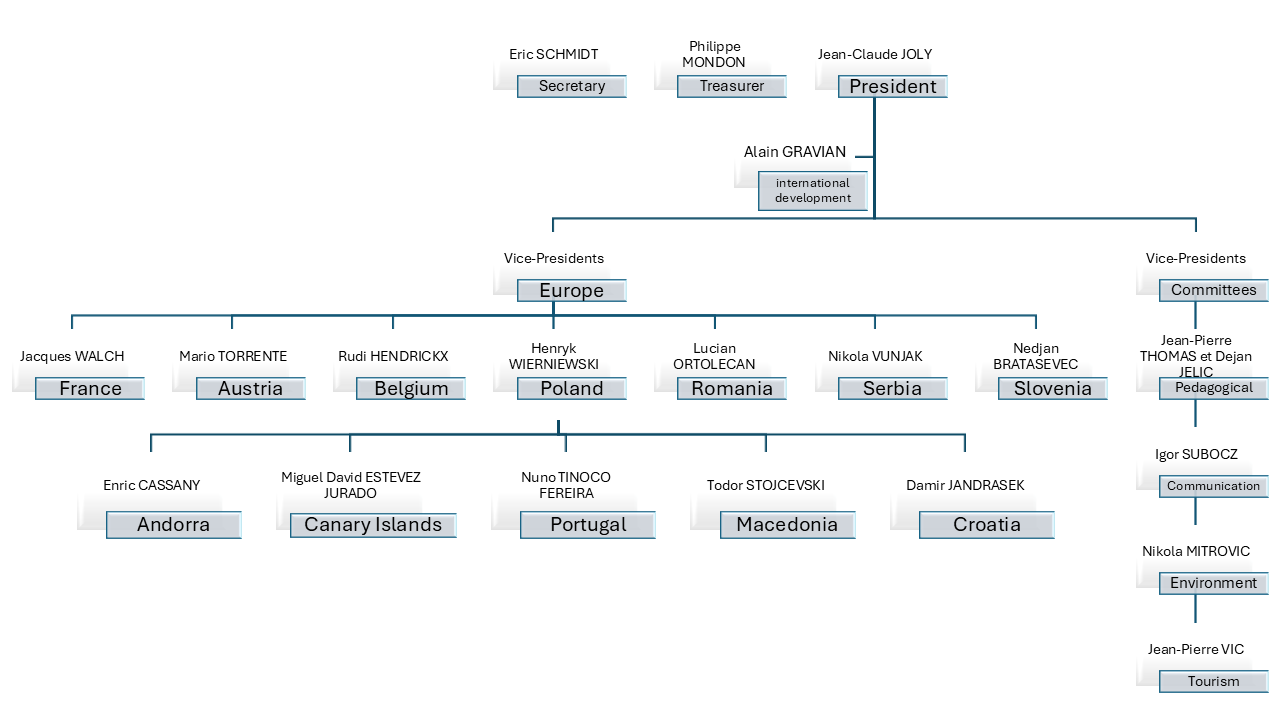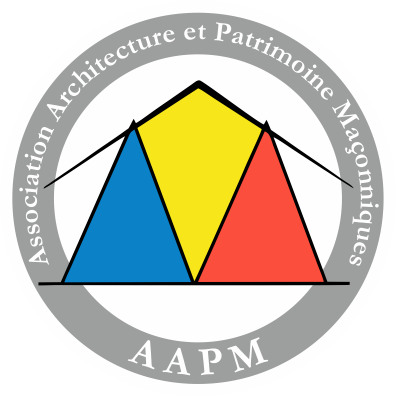The association
Introduction
The AAPM is an association governed by the law of July 1, 1901, and the decree of August 16, 1901, titled “Association for Masonic Architecture and Heritage” (AAPM). It was registered on October 12, 2019, with the Prefecture of Paris and is listed in the RNA under the number W751254151 and SIRET number 879231991D00016.
The association’s objective is to promote remarkable Masonic architectural heritage and its dissemination in France and Europe, reflecting the representative dimensions of European humanistic and democratic values.
Following the COVID-19 period, the activities of the Association for Masonic Architecture and Heritage were put on hold. They have been reactivated since January 2024, and an Extraordinary General Assembly voted on new Statutes that enable the revival of projects, notably the application for certification within the framework of the Cultural Routes of the Council of Europe.
The members are divided as follows:
Surveyor Members:
These members are those whose mission is to participate in and collectively build the association’s project, define its spirit, and implement it in all its dimensions, especially internationally. They are legal entities, each represented by one of their leaders, authorized by their organization to exercise all voting rights and necessary resources for implementing the association’s development projects they are involved in, actively participating and ensuring its proper execution. Currently, these are:
- Grande Loge de France
- Supreme Council of France
- Fraternity and Humanism Endowment Fund
- Congress of Lodges of Île de France, Overseas, and Distant Orients
- Museum Archives Library
- Grande Loge de France of Austria
- Grande Loge of Belgium
- Grande Loge of Cultures and Spirituality in Poland
- National Grand Lodge of Romania
- National Grand Lodge of Serbia
- Regular Grand Lodge of Slovenia
- Grande Loge of North Macedonia
- Grande Loge of Canary Islands
- The Portuguese National Grand Lodge
- Regular Grand Lodge of Croatia
- Regular Grand Lodge of Andorra
Host Members:
These are the associate members responsible for the practical and operational implementation of heritage projects undertaken by the association’s Board of Directors. Due to their role, they are key players in local and territorial connections with all local tourist, educational, cultural, and artistic stakeholders. They contribute to communication projects around each site and propose any form of activity that enhances the sites by integrating them into their environment.
Currently, there are three sites in France:
- Marseille
- Paris
- Rochefort-sur-Mer
Two sites in Poland:
- Ustron
- Tarnowskie Gory
Benefactor Friends Members:
Through their actions, the “Benefactor Friends” members ensure the dynamic of the actions undertaken by the association. Beyond providing financial or organizational support, they contribute by:
- Facilitating actions around the sites
- Promoting the Masonic ideal at the European level through their networks, in its philosophical, humanistic, and heritage dimensions
- Ensuring the connection between all structures involved in this initiative
- Putting, as needed and necessary, their local and regional administration or their international infrastructure at the service of disseminating European Masonic heritage
Currently, these are:
- Grande Loge de France
- Supreme Council of France
- Fraternity and Humanism Endowment Fund
- Congress of Lodges of Île de France, Overseas, and Distant Orients
Walking Members:
They represent all the friends of the association. Their membership is not merely financial support; it comes with a duty to promote our Masonic values through its heritage and culture. Today, there are more than ten members:
The organization chart

The Scientific and Advisory Council
- Representatives from the “Surveyor” members who belong to cultural and heritage-focused structures. Special emphasis is placed on Research Lodges and associations responsible for archives, libraries, and museum spaces.
- Any other qualified individuals who are not members of the association (such as architects, historians, etc.).
The mission of the Scientific and Advisory Council includes:
- Defining the criteria for any new membership in the association.
- Providing opinions on all operations undertaken to enhance our cultural and architectural heritage, especially in terms of ensuring their proper alignment.
- Proposing a program of work and research within the network.
- Managing the dissemination of these works within the networks, in coordination with the Communication Commission.
- Organizing any promotional actions and initiatives to enhance the sites and heritage (e.g., traveling exhibitions, conferences, publications, etc.).
Current members include:
- Gérard GABELLA, Interpreter Guide
- François GRUSON, Architect
- Maxime AUBRUN, Deputy President of the Museum Archives Library of the Grande Loge de France
- Jacques WALCH, Grand Archivist of the Supreme Council of France
- Dominique LOSAY, Federal Advisor of the Grande Loge de France in charge of cultural affairs
- Heinz ZIMMERBAUER, Project Support
- Wolfgang ROHRBACH, President of Europa Nostra Austria
- Dejan JELIC, Member of the Scientific Advisory Board of Europa Nostra
- Dan Octavian PAUL, Historian, Museum Curator
- Bruno VANVERDEGHEM, Grand Archivist and Librarian of the Grande Loge of Belgium
- David VERGAUWEN, Director of the Documentation and Study Center of Belgian Freemasonry
cartographIE
France
Andorra
Austria
In Austria, the paths lead to Vienna, rich in Masonic history, which can be discovered throughout its well-restored streets and buildings. Exploring this history takes one back to a significant heritage, from Mozart to the Austro-Hungarian Empire, where Freemasonry is prominently present.
Belgium
Canaries
Following the autonomist movement within the Grand Orient of Spain in 1920, the Canarian lodges Añaza, Abora and Andamana jointly decided to create a Regional Grand Lodge of the Canary Islands. For this reason, on 28 November 1922, a committee met in Santa Cruz de Tenerife to organise a Regional Grand Lodge, made up of representatives of the Añaza (José Freixa Martí), Abora (Julián Rodríguez Ballester) and Andamana (Compagnie Juan Vich) Lodges, agreeing to appoint Amado Zurita Colet, from Añaza, as President.
On 20 February 1923, the Supreme Council of the 33rd Degree for Spain and its Dependencies issued a communication to Añaza Lodge 270 in which it decided to authorise the constitution of a Regional Grand Lodge of the Canary Islands which would sponsor the Lodges established there ‘in view of the existing reasons for doing so’.
The transition to democracy restored the legality of Spanish Freemasonry. Since the early 1980s, Canarian Freemasonry has concentrated on Gran Canaria, Tenerife and Lanzarote, initially attaching itself to the Grand Lodge of Spain and its Supreme Council of the 33rd Degree, not without some English reticence due to the philosophy of the Rite of Emulation. But the Masonic feelings of Canary Island Freemasons, linked to their historical tradition, are far removed from the Anglo-Saxon concept of ‘brotherhood’, not only in ritual but also in way of thinking.
Croatia
North Macedonia
Poland
In Poland, the journey first leads to the University Library of Poznan to see 80,000 Masonic works in various languages, including 2,400 in French dating back to 1730, which were stolen during World War II by the Nazis.
Next, in Tarnowskie Góry, a UNESCO-listed town, the cultural heritage has been enriched thanks to the town hall, which recovered objects from two Masonic lodges destroyed by the Nazi regime to create a museum. In this region, rich in silver mines, Freemasonry was highly developed. In the same town, a beautifully reconstructed castle houses a Masonic museum and a temple with Masonic furniture, where the lodge of the Grand Lodge of France has been able to meet for its work. One can spend a few days there, as there is a hotel and a restaurant.
Portugal
Our Institution, characterised by its commitment to Regular and Traditional Freemasonry, plays a significant role in the preservation and promotion of Masonic principles.
Romania
Since 1848, there existed in the center of Bucharest a ‘Street of the Freemasons,’ which retained this name until October 1940 (renamed Ștefan Furtună during the communist era and Mircea Vulcănescu since 1990). The ‘Master Mason Manole Walk’ attests to a myth of the guild of church builders in the Middle Ages on the territory of present-day Romania, which Mircea Eliade had already connected to the founding myths of Freemasonry. The country offers explorers all sorts of discoveries of remarkable architectural and Masonic heritage sites.
Serbia
A stroll through Belgrade offers many architectural surprises, revealing true treasures engraved on the facades of buildings. You will also find two suggested walks in the city, which provide a glimpse into Serbian heritage that has been miraculously preserved despite challenging periods since 1940. Enjoy the discovery !
